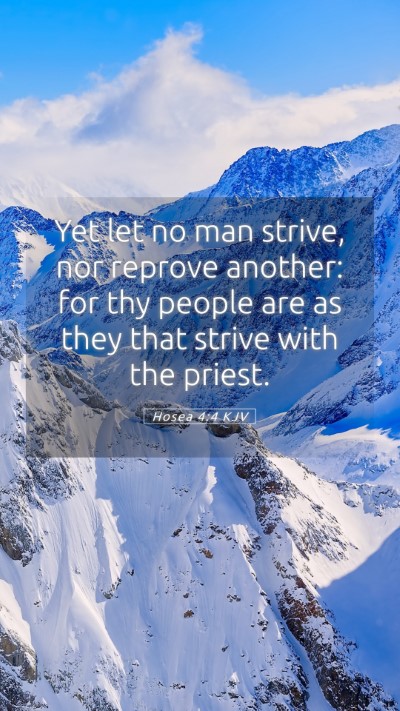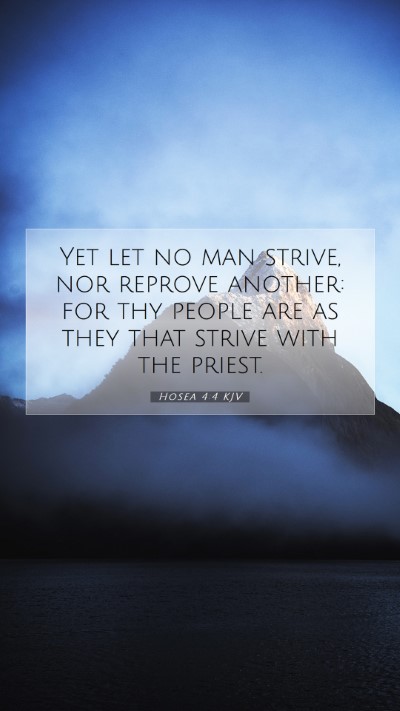Old Testament
Genesis Exodus Leviticus Numbers Deuteronomy Joshua Judges Ruth 1 Samuel 2 Samuel 1 Kings 2 Kings 1 Chronicles 2 Chronicles Ezra Nehemiah Esther Job Psalms Proverbs Ecclesiastes Song of Solomon Isaiah Jeremiah Lamentations Ezekiel Daniel Hosea Joel Amos Obadiah Jonah Micah Nahum Habakkuk Zephaniah Haggai Zechariah MalachiHosea 4:4 Meaning
What is the meaning of Hosea 4:4?
Yet let no man strive, nor reprove another: for thy people are as they that strive with the priest.
Hosea 4:4 Bible Verse Meaning
Understanding Hosea 4:4: A Comprehensive Bible Verse Commentary
The verse Hosea 4:4 states: "Yet let no man strive, nor reprove another: for thy people are as they that strive with the priest." This passage offers rich insights into the condition of Israel during the time of Hosea, reflecting themes of accountability, leadership, and the consequences of spiritual decline.
Overview of the Verse
In this chapter, God, through the prophet Hosea, addresses the moral and spiritual degradation of Israel. He highlights the challenges and conflicts within the community, particularly regarding the role of spiritual leaders and the people’s relationship with them.
Key Themes and Insights
- Conflict and Striving: The phrase "Yet let no man strive" suggests a call for peace amidst strife. It indicates that the people of Israel are engaged in pointless arguments and conflicts rather than striving for righteousness.
- Accountability and Leadership: The latter part of the verse points to the role of the priest, symbolizing spiritual leadership. The reproach against the people striving with the priest indicates their rejection of divine guidance.
- Human Nature and Resistance: This verse reveals the tendency of humanity to resist correction and divine authority, which can lead to further spiritual decline. It reflects a common theme seen throughout biblical texts regarding obedience and rebellion.
Commentary Insights
Matthew Henry
Matthew Henry emphasizes the futility of arguing and correcting one another in the face of such widespread spiritual failure. He highlights that the people’s disobedience to God’s laws has led to this confusion, and only repentance can restore them.
Albert Barnes
Albert Barnes interprets this verse as a warning against the internal conflicts and dissension within Israel. He notes that the struggles with spiritual leaders come from the people's unwillingness to submit to God's authority, illustrating the broader calamity of the nation.
Adam Clarke
Adam Clarke reflects on the phrase about the priest, noting that it is a representation of God’s appointed leaders. He suggests that instead of striving against these leaders, the people should seek unity and guidance in their spiritual journeys, emphasizing the importance of respecting God's ordained leadership.
Cross References
- Jeremiah 2:8: "The priests said not, Where is the Lord? and they that handle the law knew me not: the pastors also transgressed against me." This verse echoes the failure of leadership that Hosea laments.
- Hosea 5:1: "Hear ye this, O priests; and hearken, ye house of Israel; and give ye ear, O house of the king; for judgment is toward you, because ye have been a snare on Mizpah, and a net spread upon Tabor." This emphasizes the accountability of priests and leaders.
- Isaiah 3:4: "And I will give children to be their princes, and babes shall rule over them." This verse illustrates the chaos when proper leadership is absent, similar to Hosea's concerns.
Applying Hosea 4:4 in Daily Life
Understanding this verse can help individuals recognize the value of godly leadership and the importance of unity within the community of faith. Here are a few applications:
- Seek reconciliation instead of conflict in your relationships.
- Respect and support spiritual leaders who guide you in faith.
- Be open to correction and guidance from God's Word.
Conclusion
Hosea 4:4 carries profound meanings regarding human behavior, accountability, and the consequences of disregarding spiritual authority. By studying this verse, readers can gain valuable insights into how to navigate their faith journeys and foster healthier community dynamics.
Further Study Resources
If you're looking for additional analysis and insights on biblical texts, consider exploring the following:
- Bible study guides and commentaries.
- Online Bible study courses that cover the Old Testament.
- Bible study materials focusing on prophetic literature.


